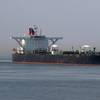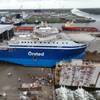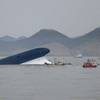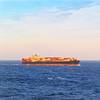Slow Down, Whales and People X-ing
Two recent shipping incidents in BC Canada waters have heightened the fears of the Gitga’at First Nation facing the prospect of the world’s largest oil-tankers passing right past their village of Hartley Bay. Enbridge has teamed up with other multinational oil giants to build the Northern Gateway Pipeline to carry oil from Alberta’s tar sands to a port in Kitimat where it would be loaded onto tankers roughly double the size of the infamous Exxon Valdez. The shipping lanes proposed by Enbridge plunge straight through the heart of the Great Bear Rainforest and prime whale habitat.
In the first incident, a cruise ship docked in Vancouver with a dead Fin whale impaled on its bow. This second largest animal on Earth, is especially vulnerable to being struck by ships. This summer, Gitga’at watchmen and scientists have been observing large feeding groups of fin whales using the same waters the oil-tankers would drive through. The fins whales are in addition to the orcas and humpback whales that have been steadily increasing their use of Gitga’at territory in recent years. All these species are already listed as “Threatened” by Canada’s Species at Risk Act.
Gitga’at territory encompasses all shipping lanes that lead to Kitimat. The scientists of Cetacealab have been studying whales in this area since 2001. Their spokesman Hermann Meuter said, “We are very concerned that collisions between whales and ships occur more often that any of us are aware. The prospect of massive oil tankers navigating this coast in the future is very worrisome. It’s not a matter of ‘if whales will be struck’, but rather ‘how many will be killed’ and ‘can their vulnerable populations withstand the pressure’.”
In the second recent incident, the wash of a ship swamped and sank a small charter vessel in Prince Rupert Harbour. While an oil spill of any size would devastate the pristine waters and well-being of the Gitga’at First Nation, the waves and wash from the normal operation of the huge ships poses a threat to Elders gathering clams, children harvesting seaweed and any small personal, sport or commercial vessel operating in the Territory.
Gitga’at spokesman Cameron Hill said. “These incidents confirm to us the risks are more than just about oil spills. Our people and territory would be severely impacted just by those oil-tankers passing through. There is nothing but risk in this whole process for the Gitga’at people. There are no benefits. I have not heard one.”
(www.whaleresearch.ca)











